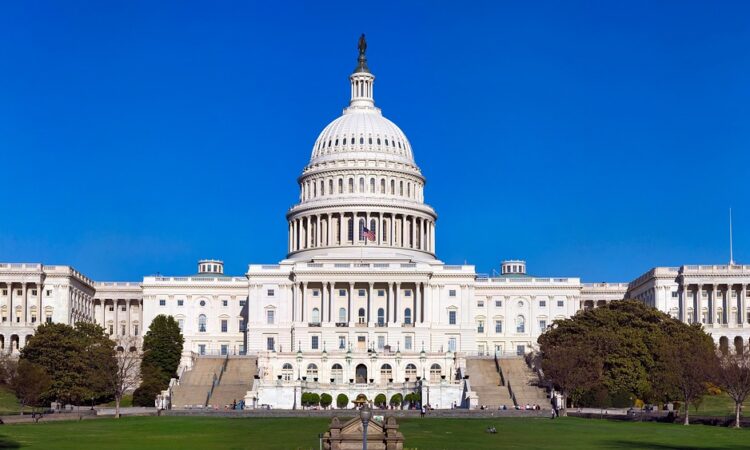
Legislation cleared by a key House of Representatives committee has fed concerns that drones produced by Chinese company Da-Jiang Innovations (DJI) will effectively be banned in the US.
The proposed bills approved by the House Energy and Commerce Committee on March 20 represent the latest effort by the federal government and various state governments to restrict the use of DJI drones in the US. There was no dissent on the committee, with all Republicans and Democrats backing the bills, citing national security concerns.
The bills, the Countering CCP Drones Act and the Foreign Adversary Communications Transparency Act, are now under consideration in the full House.
Specifically, the Countering CCP Drones bill would prohibit DJI drones from operating on US communications infrastructure, which–while not an outright ban–would effectively render the drones unusable in the US, contend a cross-section of commercial drone operators, including public safety organizations such as fire departments.
The de facto ban would have wide-ranging implications for US commercial drone operators. Vic Moss, CEO of the Drone Service Providers Alliance, estimates “67% of the [UAV operators] in this country would go out of business if we couldn’t use Chinese drones.”
The problem, he said, is that DJI’s drones are vastly superior to any drones manufactured in the US. “I don’t know a [US drone operator] out there who uses Chinese drones that wouldn’t buy an American drone that was comparable in price and reliability,” he told Commercial UAV News. “Five years from now, [comparable quality US-produced drones] still are not going to exist. They don’t exist now. They’re not designed yet. So, even if they were designed right now, we don’t have the infrastructure to build them. We don’t have the supply chain.”
Rep. Elise Stefanik (R-New York), the primary sponsor of the bills cleared by committee on March 20, said “Congress must use every tool at our disposal to stop communist China’s monopolistic control over the [US] drone market.”
Demonstrating the bipartisan support for the legislation, Rep. Raja Krishnamoorthi (D-Illinois) said the Biden administration “has shown that DJI is a threat to our national security.”
He added: “Our legislation will further protect our communications equipment while strengthening American supply chains by ensuring foreign-manufactured technologies that pose serious security threats, such as DJI’s, cannot operate in American networks.”
DJI has strongly pushed back against the Countering CCP Drones bill in particular. Viewpoints, the “official DJI blog” posted on the company’s website, asserted the legislation “would severely disrupt the drone market in the United States as operators scramble to find alternatives, leading to product shortages and higher costs for all users.”
The bill “would put lives at risk,” DJI said, adding: “If public safety agencies can no longer access these tools, they lose access to critical situational awareness in … high-stakes situations.”
Stefanik and other members of Congress have argue that, in addition to being a domestic national security concern, DJI should be effectively sanctioned because the lawmakers believe the company’s drones have been used as part of Chinese government campaigns that violate human rights.
Moss said DJI’s drones have become the latest “bad guy” in the tense relationship between China and the US. “When it comes to anti-China fervor, drones are the easy target right now,” he added. “But it’s not just drones that we can’t compete in. We can’t make a TV in this country that competes with Chinese TVs.”
On DJI’s website, the company states it “will always look for ways to make your data and privacy more secure by tightening existing systems, innovating new ones and embracing new methods and technologies.”
There are other moves afoot to limit the use of DJI drones in the US. On March 19, a bipartisan group of 13 House members wrote a letter to top Biden administration officials, including Commerce Secretary Gina Raimondo and Homeland Security Secretary Alejandro Mayorkas, calling for the 25% tariff on Chinese drones to be raised.
The House members, which included Stefanik, Krishnamoorthi and Rep. Mike Gallagher (R-Wisconsin), the chair of the House Select Committee on the Strategic Competition Between the US and the Chinese Communist Party, also called for the Biden administration to crack down on Chinese drone manufacturers “avoiding … tariffs by transshipments through third countries.”
The House members noted China’s dominance in the US drone market. “Companies like DJI and Autel Robotics receive immense subsidies from the Chinese government, enabling Chinese drone makers to overtake 77% of the US hobby drone market and over 90% of the U.S. commercial drone market,” a Select Committee statement said.
In the letter, the lawmakers laid out their case as to why DJI’s drones are a national security issue.
“The prolific usage of PRC UAVs by US law enforcement, other government agencies and utility companies creates risks that these platforms could be used to map and transmit sensitive US infrastructure,” they wrote. “Recent research found that DJI drones can transmit their GPS location, as well as the coordinates of their operators, and DJI is increasingly offering the company’s drone operators the ability to livestream through DJI’s cloud.”
The House bills and the letter’s call for tougher action from the Biden administration appear to represent a dual-track approach to limiting DJI’s ability to sell drones to US operators.




